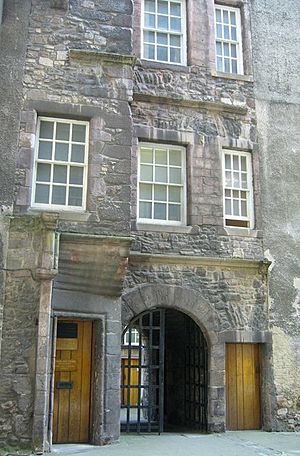Hans Poppilman facts for kids
Hans Poppilman (born 1574) was a Danish chef who worked for Anne of Denmark, the Queen of Scotland and England. He came to Scotland with Queen Anne in May 1590 when he was about 16 years old. He started as a helper for the head chef, Hans Drier, and later became the Queen's Master Cook.
Contents
Working for the Queen
When Hans Poppilman first arrived in Scotland, he was part of Queen Anne's team. The Queen's kitchen had several roles. There was a Master Cook, a foreman (who was the Master Cook's helper), and a few other servant cooks. There were also "turnebroches" whose job was to turn the spit for roasting meat. Many other people also worked in the kitchen.
In 1591, some of the Queen's kitchen staff stopped working. They said their pay was not fair. King James VI (Queen Anne's husband) had to step in. He asked his Chancellor, Lord Maitland, to fix the problem. Hans Drier, the Master Cook, and young Poppilman had to do the work of the missing staff. They had to prepare the supper themselves.
Poppilman's Pay and Clothes
At first, as a foreman cook, Hans Poppilman received money for his clothes. This was £40 Scots, which was enough for two outfits. This was a custom from Denmark. Later, the head chef, Hans Drier, received £200 Scots for himself and his two young helpers. This was a cash payment instead of clothes.
When Poppilman was promoted, Queen Anne gave him special clothes as a gift. These included a black cloak made of fine cloth from London. It was decorated with Spanish taffeta. He also received a fustian doublet, which was a type of jacket.
A Royal Banquet in Edinburgh

On May 2, 1598, the city of Edinburgh hosted a big dinner. It was for Queen Anne's brother, the Duke of Holstein. This banquet was held at Riddle's Court and was a very happy event. Hans Poppilman was paid £10 Scots for his work at this special meal.
The banquet featured many sweet treats. A Flemish confectioner named Jacques de Bousie made sugar creations. He was a favorite of the Queen. He was paid a large sum of £184 Scots for his sugar works. This was one of the most expensive items for the dinner.
Two apothecaries, John Lawtie and John Clavie, made a sweet, spiced wine called Hippocras. Another apothecary, Alexander Barclay, made "vergeis" (a sour juice) and perfumed rose water. Two French experts, Estienne Piere and Robert Barbier, prepared the table linens and napkins.
Life in England
In 1603, Hans Poppilman moved to England with Queen Anne. This happened during the Union of the Crowns. This was when King James VI of Scotland also became King James I of England.
Many years later, in July 1618, Hans Poppilman became a "denizen" of England. This meant he had some of the rights of an English citizen. Two other people from the Queen's household, a French musician named Louis Richard and a French servant named Arthur Bodren, also became denizens at the same time.
After Queen Anne died in 1619, Poppilman asked King James for payment. He mentioned that he had started working as a cook for Queen Anne's father, Frederick II of Denmark. Hans Poppilman was married and had children. His wages were paid by the King's household, not the Queen's. As the Queen's master cook, he was given a yearly payment of £50.
 | Chris Smalls |
 | Fred Hampton |
 | Ralph Abernathy |

